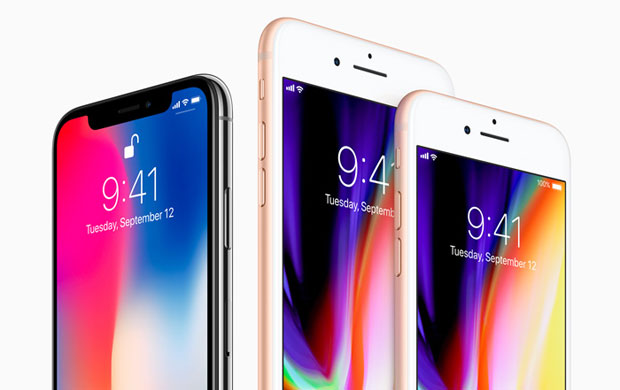There was some bad news for owners of the latest iPhone models on Monday.
Batteries in the iPhone 8 and X may have shorter life spans than those in prior models, according to an article in ZDNet.
The battery in contributor Adrian Kingsley-Hughes’ iPhone 8 Plus was racking up recharge cycles at an alarming rate, he wrote.
A recharge cycle occurs when a phone is charged from zero power to 100 percent. Typically, phone batteries begin losing their effectiveness after 500 recharges. Up to that point, they can hold up to 80 percent of their charge. After that, it’s usually downhill for the battery.
After only four months, Kingsley-Hughes discovered that his new iPhone had hit 91 recharge cycles, a much faster rate than he’d seen in his previous iPhones. At that rate, the battery would last about 20 months — or less, if wear and tear were factored into the calculations.
“That’s scary, doubly so when I consider that this iPhone hasn’t been heavily used in the four months that I’ve had it,” he noted. “And it’s not just me. I’ve heard from other iPhone X and iPhone 8 owners who tell me that their battery recharge cycles are in a similar ballpark.”
Convenience Sapping Battery Life Span?
Based on his past experience, Kingsley-Hughes had expected the battery to last at least three years before hitting the 500 recycle mark, he wrote.
As a possible culprit, he pointed to the wireless and fast-charging features of the new iPhones. They make charging more convenient, so the phones are charged more often, resulting in an accelerated recycle count.
However, the technologies themselves don’t have an impact on a battery’s life span. Charging a phone with a cord instead of wirelessly, for example, isn’t going to add three months of life to a battery.
“There’s nothing specific to wireless charging technology that will have an impact on battery life span,” said Ian Fogg, a senior director at IHS Markit.
“How long it is before you hit 80 percent capacity depends on how heavily you use your phone,” he told TechNewsWorld. “If you’re streaming video continuously, that will reduce the capacity of the phone much more quickly than if you’re using it for light Web browsing.”
Understated Problem
The life span problem isn’t restricted to the latest iPhones, observed Kyle Wiens, cofounder of iFixit, which repairs iPhones and other gadgets.
Further, “he’s underestimating how bad the problem is with existing iPhones,” Wiens said of Kingsley-Hughes.
“We tend to see people needing to replace their battery every 18 months,” he told TechNewsWorld.
The battery life of the iPhone X doesn’t seem to be as long as the iPhone 7, Wiens added. “It seems like the iPhone X doesn’t get as long battery life during the day. That means you’re going to go through more cycle counts charging it.”
Problem for Everyone
The iPhone X’s battery life hasn’t posed a problem for Kevin Krewell, principal analyst at Tirias Research.
“I have the iPhone X, and I’ve seen really good battery life with it so far,” he told TechNewsWorld.
“At CES, I got a full day out of the iPhone X, while many people were jacking their phones into external battery packs,” he continued.
“I think wireless charging can be a problem because it’s too easy to drop the phone on the charger multiple times a day,” Krewell said, “but cycle life for lithium-ion batteries is a problem for everyone. Long term, we will need another battery technology for phones, laptops, tablets and cars.”
If wireless and fast charging are leading to more frequent fill-ups and reduced battery life span, then it’s more than just an Apple problem, said Charles King, principal analyst at Pund-IT.
“Since battery design is relatively constant and most vendors include fast and wireless charging options, I expect a broader number and range of users will be impacted by this problem,” he told TechNewsWorld.
CPU Throttling
This latest battery flap comes on the heels of Apple’s controversial decision to throttle the processors in older iPhone models with low-capacity batteries.
Apple has attempted to quell the uproar over that move by offering battery replacements for older models at the discounted price of US$29.
“Apple handled the performance-throttling issue as it has past technical problems, by slowly working its way from denial to actively creating a fix,” King said.
“Yes, it could do better, but customers haven’t overly punished the company for past missteps, and I doubt they’ll do much to injure Apple this time around,” he added.
“The real problem is that Apple has been pretending that you don’t really need to replace batteries,” said iFixit’s Wiens, “and it’s clear now that the batteries need to be replaced more often than the phones do.”






















































